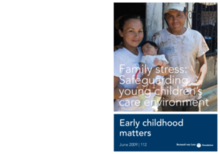Today’s families faced innumerable struggles even before the global economic crisis created an additional dimension of uncertainty. Many families grapple with poverty, lack of opportunities to earn a livelihood, and consequent difficulties in meeting basic needs such as food and shelter. Others confront a daily reality of violence, whether within the family or in the wider community due to such causes as urban gangs or civil unrest. AIDS, drug abuse, natural disasters – it is not difficult to continue the list of factors that place families in today’s world under stress.
When families are under stress, their children’s wellbeing is compromised. Young children’s security is anchored in the family, which ideally should provide a caring, stable and protected environment in which children gain the confidence to explore and learn how to handle the challenges of growing up. But when parents and caregivers lose the sense that they control their own lives, it becomes extremely difficult for them to create an environment that shields their children from insecurity. The negative impacts can be seen in many different areas of child development. It is not just up to caregivers to adapt to stressful environments. Equally, early childhood professionals must adjust their strategies and methodologies to situations in which families are under stress. They must design ways to help caregivers mitigate the effects of stress factors on themselves and their children. To that end, this edition of Early Childhood Matters asks: “What are the most effective ways of dealing with and diminishing parental stress, and what are the factors that contribute to children’s resilience and coping mechanisms in challenging care environments in particular contexts?”

